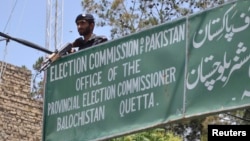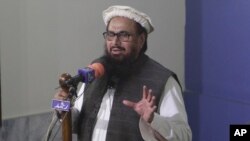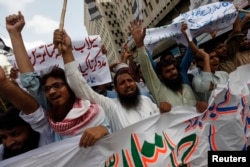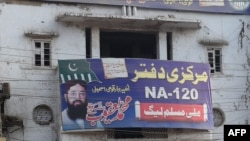Pakistan’s Election Commission (ECP) on Wednesday again rejected the registration application of Milli Muslim League (MML), a U.S.-designated terrorist political party.
Citing its alleged terror ties, the national electoral body said MML cannot participate in the country’s general elections scheduled for July 25.
The electoral entity denied MML’s right to register in October 2017. At that time, Pakistan’s Ministry of Interior Affairs had written to ECP that MML was a cover for Jamaat-ud-Dawa (JuD), a U.S.-designated terror-sponsoring organization in Pakistan, and therefore the group should not be allowed into the national political system.
“The government is vigilant and under no circumstances will allow any political party with a proven record of promoting violence and terrorism to spread their extremist ideology through democracy and political means,” Tallal Chaudhry, Pakistan’s then-minister of state for interior affairs, told VOA.
Dissatisfied with ECP’s verdict, MML took the matter to court and maintained the refusal was illegal and unconstitutional.
Earlier in March, the Islamabad High Court ordered ECP to revisit the matter and to allow MML to be registered as a political entity in Pakistan.
Terrorist political party
The U.S. State Department in April imposed sanctions on MML and declared the party and its leadership terrorists.
The U.S. added that the MML and Tehreek-e-Azadi-e-Kashmir were aliases for Lashkar-e-Taiba (LeT), a U.S.-designated terror group. The United States categorically declared seven MML leaders as terrorists.
Both of these parties were established last year and are tied to Hafiz Saeed, the Islamist cleric who founded Lashkar-e-Taiba (LeT) in the 1980s.
Saeed is the alleged mastermind of the 2008 attack in Mumbai that killed more than 160 people, including six Americans. He was added to the U.N. Security Council Resolution 1267 sanctions list in December 2008.
The U.S. designated him a global terrorist in 2012 and has offered a bounty of $10 million for information that would lead to his arrest.
LeT’s front organizations
For years, Saeed has been trying to avoid sanctions and increasing international pressure on LeT by creating cover organizations with the same motives. Saeed renamed LeT to Jamaat-ud-Dawa (JuD) and founded another charity organization Falah-e-Insaniat Foundation (FIF). Both JuD and FIF are placed on U.S. and U.N. terror watch lists.
He founded Lashkar-e-Taiba to liberate Indian-administered Kashmir and to subsequently merge it with Pakistan. Over the years, the group expanded its operations into neighboring Afghanistan.
Pakistan has been under increasing pressure for its inability to prosecute Saeed and sanction JuD and its subsidiary Falah-i-Insaaniyat Foundation (FIF), which operate freely in the country, despite being placed on the U.N.’s terror watch list.
In a press briefing in February, U.S. State Department spokeswoman Heather Nauert criticized Pakistan for its inaction against Saeed.
“How many times have we talked about the person who Pakistan let out of house arrest, who was responsible for the Mumbai attacks back in 2008 that killed so many people, including Americans, too?” she asked.
Pakistan, on the other hand, maintains there is insufficient evidence to connect Saeed to the Mumbai attacks and that he has been acquitted by the courts after due process.
Milli Muslim League
MML was established in August 2017 as a political wing for JuD, with an aim to enter Pakistan’s political arena.
MML-backed candidates participated in the country’s by-elections last year. The party’s supported candidate in an important by-election in Lahore in September 2017 finished fourth in the race.
At that time, Pakistan’s Senate strongly criticized ECP for allowing MML-backed supporters to participate in the by-elections.
In a recent meeting between Pakistan’s election commission and representatives of the major political parties to formulate measures for the upcoming general elections, the parties strongly urged the electoral body to bar militant-turned-political parties from participating in the election.
“The Election Commission works according to the law and constitution of the country,” commission spokesperson Altaf Ahmad had told VOA. “One example is the Milli Muslim League, a party with alleged ties to a banned militant group, was not allowed to be registered once the government and intelligence agencies lodged their concerns about MML to ECP,” Ahmad said.








